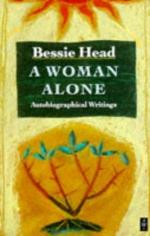
|
| Name: _________________________ | Period: ___________________ |
This test consists of 15 multiple choice questions and 5 short answer questions.
Multiple Choice Questions
1. In her research for her novel, "Maru," Bessie worked right at the roots of what?
(a) Oppression.
(b) Racial hatred.
(c) South African cultural diversity.
(d) Christianity.
2. In "A Question of Power," Bessie states that what can lead a people or a nation into a terrible abyss of destruction?
(a) Rage.
(b) Prejudice.
(c) Greed.
(d) Evil.
3. What was the name of the conquered tribe in Botswana?
(a) Bomangwato.
(b) Bangato.
(c) Batawna.
(d) Basarwa.
4. Josef Herman, the artist who lived through the Nazi invasion of Poland, fled to what country?
(a) United States.
(b) Ireland.
(c) England.
(d) Spain.
5. How many major tribes are there in Botswana?
(a) 2.
(b) 3.
(c) 5.
(d) 4.
6. Bessie's suffering in South Africa created in her a reverence for what?
(a) Quiet.
(b) Ordinary people.
(c) Peace.
(d) Innocence.
7. Bessie states that Botswana men do not care about what?
(a) Their children.
(b) Their wives.
(c) Work.
(d) Their pride.
8. By the 1830's, most of the tribes of South Africa were what?
(a) Extinct.
(b) Christians.
(c) Landless.
(d) Assimilated into other tribes.
9. Who was the great leader of Botswana that protected it's people?
(a) Abbal.
(b) Joran.
(c) Kobal.
(d) Khama.
10. In Chapter 2, whose religious ideas hold great appeal for Bessie?
(a) Professor Mbiti.
(b) Buddah.
(c) The local bishop.
(d) The Pope.
11. According to Bessie, revolutionary movements are composed of people living with what?
(a) Rage.
(b) Mental instability.
(c) Regret.
(d) Poverty.
12. Bessie states that one day all nations shall dwell under what shadow?
(a) Total equality.
(b) The Pharaoh's.
(c) Peace.
(d) Global civilization.
13. According to an account by Dr. W.H.C. Lichtenstein, Botswana men only do work that can be what?
(a) Viewed as manly.
(b) Considered too important for women.
(c) Dropped suddenly.
(d) Sold or traded.
14. In Chapter2, how does Bessie describe her third novel, "A Question of Power"?
(a) Intensely personal and private.
(b) A work of excruciating detail.
(c) The most satisfying.
(d) Difficult to write.
15. Bogadi marriages are arranged to retain what?
(a) Control.
(b) Cattle wealth.
(c) Polygamy.
(d) Suppression of women.
Short Answer Questions
1. In "Notes on novels," how is pre-colonial invasion South Africa described?
2. What does Bessie attribute her bad habits and violent nature to?
3. What people did the Bushmen resemble?
4. In "Makeba music," where would Russian people caught dealing in the black market be deported to?
5. Bessie feels that the main function of a writer is to communicate what?
|
This section contains 380 words (approx. 2 pages at 300 words per page) |

|




